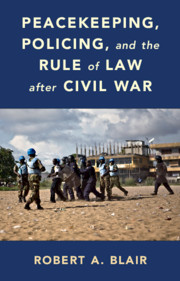Crossref Citations
This Book has been
cited by the following publications. This list is generated based on data provided by Crossref.
Walter, Barbara F.
Howard, Lise Morje
and
Fortna, V. Page
2021.
The Extraordinary Relationship between Peacekeeping and Peace.
British Journal of Political Science,
Vol. 51,
Issue. 4,
p.
1705.
2021.
Bibliography.
Leiden Journal of International Law,
Vol. 34,
Issue. 4,
p.
1001.
Blair, Robert
Moscoso, Manuel
Vargas, Andrés
and
Weintraub, Michael
2021.
After Rebel Governance: A Field Experiment in Security and Justice Provision in Rural Colombia.
SSRN Electronic Journal ,
Blair, Robert A.
and
Morse, Benjamin S.
2021.
Policing and the Legacies of Wartime State Predation: Evidence from a Survey and Field Experiment in Liberia.
Journal of Conflict Resolution,
Vol. 65,
Issue. 10,
p.
1709.
Kaltenthaler, Karl
Kruglanski, Arie W.
and
Knuppe, Austin J.
2022.
The Paradox of the Heavy-Handed Insurgent: Public Support for the Taliban among Afghan Pashtuns.
Studies in Conflict & Terrorism,
p.
1.
Blair, Robert A.
Di Salvatore, Jessica
and
Smidt, Hannah M.
2022.
When Do UN Peacekeeping Operations Implement Their Mandates?.
American Journal of Political Science,
Vol. 66,
Issue. 3,
p.
664.
BLAIR, ROBERT A.
MOSCOSO-ROJAS, MANUEL
VARGAS CASTILLO, ANDRÉS
and
WEINTRAUB, MICHAEL
2022.
Preventing Rebel Resurgence after Civil War: A Field Experiment in Security and Justice Provision in Rural Colombia.
American Political Science Review,
Vol. 116,
Issue. 4,
p.
1258.
Mahmood, Zuhaib
Beardsley, Kyle
Newton, Christopher
Roy, Chhandosi
Kathman, Jacob D.
Tucker, Colin
Nomikos, William G.
Villa, Danielle N.
Binder, Martin
Allen, Susan
Yuen, Amy
Passmore, Timothy J.A.
Shannon, Megan
Hultman, Lisa
and
Chapman, Terrence L.
2022.
The United Nations After 75: Assessing Current Understandings, Charting Fruitful Research Agendas.
International Peacekeeping,
Vol. 29,
Issue. 4,
p.
551.
Mehltretter, Andreas
2022.
Arming for conflict, arming for peace? How small arms imports affect intrastate conflict risk.
Conflict Management and Peace Science,
Vol. 39,
Issue. 6,
p.
637.
BLAIR, ROBERT A.
DI SALVATORE, JESSICA
and
SMIDT, HANNAH M.
2023.
UN Peacekeeping and Democratization in Conflict-Affected Countries.
American Political Science Review,
Vol. 117,
Issue. 4,
p.
1308.
Hunnicutt, Patrick
and
Gbaintor-Johnson, Kou
2023.
The Missing Link: Informal Political Elites and Protest in Areas of Limited Statehood.
Journal of Conflict Resolution,
Kissling, Jana R.
and
Smidt, Hannah M.
2023.
(UN-)Protected Elections – Left for Good? Withdrawal of United Nations Peacekeeping Operations and Its Effects on Violence During Electoral Periods in War-Affected Countries.
International Peacekeeping,
Vol. 30,
Issue. 2,
p.
165.
Day, Adam
and
Hunt, Charles T.
2023.
A Perturbed Peace: Applying Complexity Theory to UN Peacekeeping.
International Peacekeeping,
Vol. 30,
Issue. 1,
p.
1.
Pingeot, Lou
2023.
Policing, Security Sector Reform and the Rule of Law: More State, More Security?
Co-Operation, Contestation and Complexity in Peacebuilding: Post-Conflict Security Sector Reform
, edited by Nadine Ansorg and Eleanor Gordon, London, Routledge, 2021, 142 pp., £47.99 (hardcover), ISBN 9780367637569.
The United Nations and Security Sector Reform: Policy and Practice
, edited by Adedeji Ebo and Heiner Hänggi, Lit Verlag, 2020, 408 pp., £33.1 (softcover), ISBN 9783643803115.
Peacekeeping, Policing, and the Rule of Law after Civil War
, by Robert A. Blair, Cambridge University Press, 2021, 267 pp., $34.99 (softcover), ISBN 9781108835213.
.
International Peacekeeping,
Vol. 30,
Issue. 1,
p.
53.
Duursma, Allard
Bara, Corinne
Wilén, Nina
Hellmüller, Sara
Karlsrud, John
Oksamytna, Kseniya
Bruker, Janek
Campbell, Susanna
Cusimano, Salvator
Donati, Marco
Dorussen, Han
Druet, Dirk
Geier, Valentin
Epiney, Marine
Geier, Valentin
Gelot, Linnéa
Gyllensporre, Dennis
Hiensch, Annick
Hultman, Lisa
Hunt, Charles T.
Krishnan, Rajkumar Cheney
Labuda, Patryk I.
Langenbach, Sascha
Norberg, Annika Hilding
Novosseloff, Alexandra
Oriesek, Daniel
Rhoads, Emily Paddon
Re, Francesco
Russo, Jenna
Sauter, Melanie
Smidt, Hannah
Staeger, Ueli
and
Wenger, Andreas
2023.
UN Peacekeeping at 75: Achievements, Challenges, and Prospects.
International Peacekeeping,
Vol. 30,
Issue. 4,
p.
415.
Tiscornia, Lucía
2024.
Police reform in the aftermath of armed conflict: How militarization and accountability affect police violence.
Journal of Peace Research,
Vol. 61,
Issue. 3,
p.
383.
Hunt, Charles T.
2024.
‘To Serve and Protect’: The Changing Roles of Police in the Protection of Civilians in UN Peace Operations.
Civil Wars,
Vol. 26,
Issue. 1,
p.
98.
Levin, Andrew
2024.
The composition of UN peacekeeping operations and aid worker security.
Journal of Peace Research,
Vol. 61,
Issue. 5,
p.
726.
Hunnicutt, Patrick
2024.
International Peacekeeping Encourages Foreign Direct Investment: Subnational Evidence From Liberia’s Extractive Sector.
Journal of Conflict Resolution,
Vol. 68,
Issue. 9,
p.
1856.



